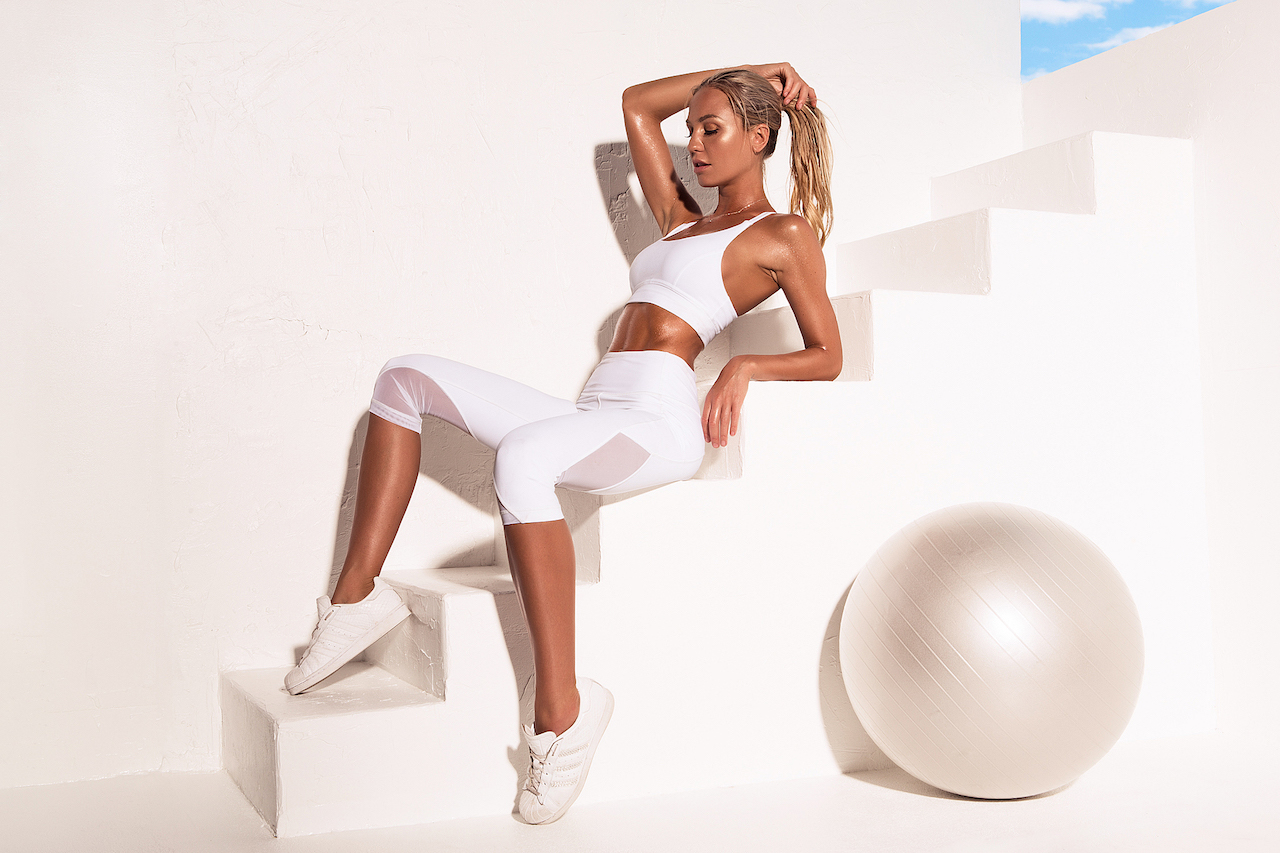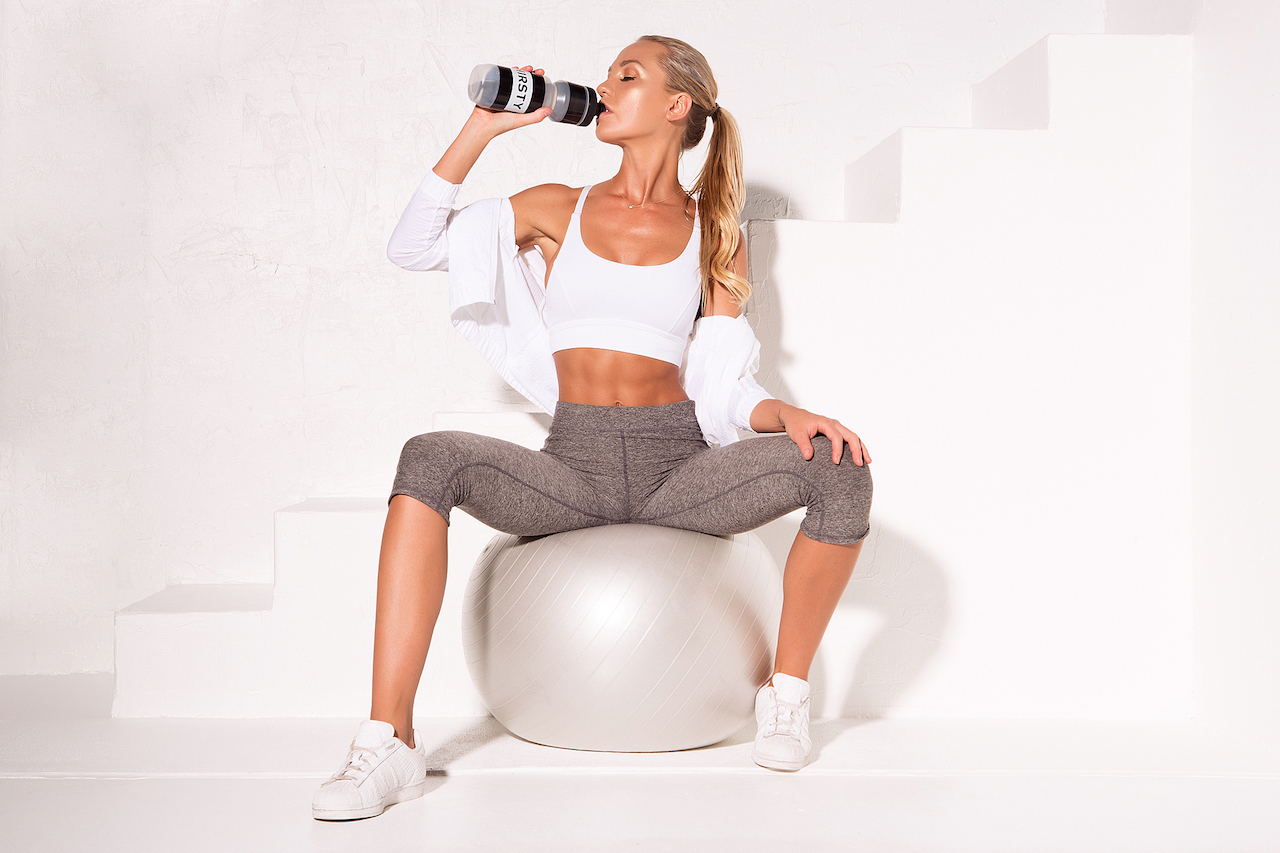
Namita Nayyar:
Do you follow any skincare and hair care routine, after a sweaty workout?
Camilla Akerberg:
I struggle to stick to a consistent skin and hair care routine and this is something I would like to get better with. When traveling- my skin care and hair care routine are the ones that seem to go out the window first unfortunately. A few things I always seem to come back to, or have episodes of consistent use is hair/skin and nail vitamins and I love Rosehip oil for my skin. I love making this at-home-remedy for a facial cleanse/exfoliation. You need the following products:
- Himalayan rock salt
- Rosehip oil
- CBD oil (I get the Be Natural Wellness Co and it’s amazing quality and helps with anxiety and sleep as well)
Mix together and gently exfoliate your skin, I then leave this on for about 20 minutes before washing off in the shower.
Namita Nayyar:
Foods to boost your strength and stamina? Supplements idle for women of all age?
Camilla Akerberg:
Complex Carbohydrates that release energy slowly into the blood stream are great for stamina and strength. Bananas are a great source of carbohydrates as well as potassium and vitamin B6 which also help with energy levels.
Fatty fish like tuna and salmon. Salmon is a good source of vitamin B12, vitamin D and omega-2 fatty acids which help reduce fatigue by decreasing inflammation in the body. Vitamin B12 combined with folic acid produce red blood cells and increase the effect of iron in the body. This will also help increase your energy. Fatty fish also increase the antioxidant CoQ10 in your body which is known to improve energy and strengthen the immune system.
High Fibre vegetables and whole grains like Sweet Potato, broccoli, brussle sprouts, quinoa and brown rice. Brown rice has less starch than white rice, and is easier to digest. Brown rice is high in fibre, vitamins and minerals and has a low GI value which mean it doesn’t peak your blood sugar levels. This help you maintain good energy throughout the day. The manganese content in high fibre food aids enzymes in your body with carbohydrate and protein breakdown to generate energy.
Protein is vital for building stamina and strength. Eggs are an amazing source of protein and high in vitamins and minerals.
Green leafy vegetables are a great source of iron, fibre, vitamin B complex and Magnesium. Iron is needed in the body to create haemoglobin which aids with circulation and supplying oxygen to your muscles. Other high iron food sources include lentils and white beans. Magnesium assist nerve and muscle function as well as macronutrient synthesis and electrolyte balance. Magnesium can also be found in nuts and seeds and whole grains.
Vitamin C boost immunity and help with increasing energy. Citrus fruits, cantaloupe, broccoli, yellow bell peppers, kiwi fruit and berries are all high in vitamin C.
Nuts and seeds are high in zinc, Vitamin E and Magnesium and high in protein which help you sustain your energy throughout the day.
Namita Nayyar:
Taboo foods to get a flat stomach?
Camilla Akerberg:
If you are looking to tone up- you may be aware that a lot of the work is done in the kitchen. Cleaning up your diet is the key to getting fat-loss results. So, what are some foods that you should limit in your diet? Don’t cut out food groups, and realize that having something a bit naughty but nice is okay- if it’s in moderation and an occasional thing.
To get a flat stomach, here are some foods you should be eating less of- limiting in your diet:
- Limit Soft drinks and fruit juices with added sugars– switch to vegetable juices and low sugar fruit alternatives.
- Limit alcohol. You don’t have to stay away from alcohol all together- Having a drink with your friends on occasion is more than okay and can be good for your social life. But, be aware that alcohol is it’s own macronutrient, and is high in calories. Also, when you drink alcohol your body will treat this as a toxin and slow down the digestion of carbohydrates, proteins and fats whilst it tries to get rid of the alcohol. This means that the other macronutrients are more likely to be stored in your body as fat.
- Limit sugary sauces and salad dressings. Why not make your own? Olive oil, lemon, and balsamic vinegar is a go-to for me!
- Limit processed foods, packaged foods and fast foods. These are commonly high in sodium, preservatives and saturated fats
- Limit high amounts of sodium and get used to cooking with a range of herbs and spices instead that will add flavour and even boost your metabolism and energy levels.
- Limit sugar in your diet. Foods high in added sugars may include:
- jams and marmalade
- candy
- confectionary
- sweets
- biscuits
- cake
- puddings
- pastries
- sugary sauces and dressings
- chocolate
- ice cream
- muesli bars.
- Granola and muesli
- soft drinks
- vitamin waters
- energy drinks
- Limit foods your body don’t digest well or you may be intolerant to. We are all different from one another and react differently to foods. Be mindful of what works for your body or what doesn’t.

Namita Nayyar:
After a long hard-working day, what do you look forward to? Stress -busting tips?
Camilla Akerberg:
Here are some of my stress- busting tips:
- Have a shower to help calm yourself
- Tea: Chose a night tea or “relax tea” that doesn’t contain caffeine, like chamomile tea or Green tea which contain L-theanine, an amino acid that reduce stress.
- Sleep more
- Meditation
- Exercise
- Connect with nature
- Take a break from your electronic devices
- Read a book
- Rub a few drops of lavender oil to your palms or spray on your pillow to help calm you down, reduce stress and aid your sleep. Other essential oils that can stimulate tranquillity is chamomile oil and vanilla oil.
- Try the following supplements to reduce anxiety and stress:
- CBD oil
- Vitamin B complex
- Valerian Root
- Magnesium
Disclaimer
The Content is not intended to be a substitute for professional medical advice, diagnosis, or treatment. Always seek the advice of your physician or other qualified health provider with any questions you may have regarding a medical condition.